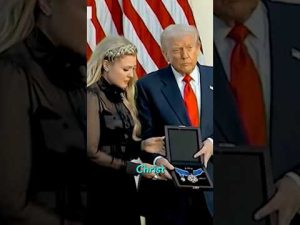In a whirlwind of political drama, recent developments surrounding former President Trump’s legal maneuvers and the Biden administration’s social media proclamations have stirred quite the pot. Amidst rising approval ratings, Trump is banking on a contentious use of the National Guard to bolster federal law enforcement in what many are labeling an unprecedented move. Christina Bobb, an attorney closely linked to Trump’s legal battles, strongly believes that Trump has a solid legal foundation for this strategy, primarily to protect U.S. Immigration and Customs Enforcement (ICE) agents and other federal officials. It seems the debate over the appropriate boundaries of military intervention in civil matters is only just heating up.
Trump is adamant that calling in the military for regular police duties isn’t on the agenda. According to him, they won’t be redirecting traffic or handing out speeding tickets. Instead, their focus is on confronting what he describes as insurrectionists attacking law enforcement. This raises a plethora of questions about the interpretation of law and order, especially when phrases like “posse comitatus” get thrown around, often making folks’ heads spin. However, Bobb argues that Trump has carefully crafted a legal approach that makes his actions permissible. It appears the stakes are high as he seeks to quell violence against federal agents amid the ongoing immigration crisis.
Meanwhile, Biden’s social media team is busy spinning tales of success regarding a ceasefire deal, with the administration attempting to snag some credit for progress that many feel Trump originally facilitated. It’s a curious PR move, considering the prevailing opinion that neither Hamas nor Israel is likely to take their marching orders from the White House. Observers might chuckle at the audacity of such claims, wondering if someone in the Biden camp hasn’t taken their morning medications. Traditional wisdom suggests that attributions of credit should be based on reality, not whimsical storytelling designed to soothe party loyalists.
Intriguingly, the political spotlight isn’t solely on the past but toward accountability for future governance. Special Counsel Jack Smith has been asked to testify before the House Judiciary Committee, stirring curiosity about the depths of his investigation into Trump and the broader judicial landscape. It’s a rare event indeed when a prosecutor is called to testify, given the protective walls typically surrounding their work. Bobb highlights the potential implications of this move, especially in light of the Biden administration’s previous disregard for executive and attorney-client privilege during high-profile cases like Smith’s investigation.
As the political drama unfolds, one can’t help but think of the broader implications for all involved. Trump’s assertive stance on deploying the National Guard, Biden’s questionable claims of success, and the unfolding legal drama surrounding Smith create a mosaic of contemporary American politics that feels like it could have been ripped from a political thriller. The twists and turns of legal and political accountability will certainly keep observers far and wide glued to their screens, waiting for the next surprise in this vivid spectacle. There’s no doubt that as this saga progresses, it will continue to ignite passionate debates across the nation and provide ripe material for future commentary.







